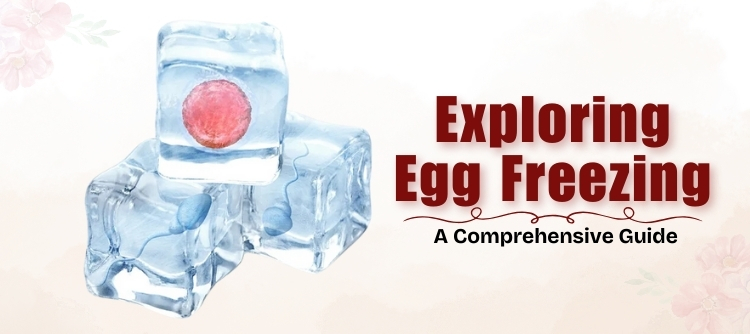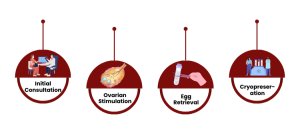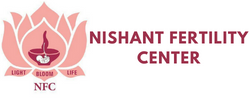Exploring Egg Freezing: A Comprehensive Guide

Fertility preservation has emerged as a revolutionary option for women planning to delay motherhood for various reasons, such as career aspirations, health conditions, or personal circumstances. Among these advancements, egg freezing, also known as oocyte cryopreservation, offers hope and control over one’s reproductive timeline. At Nishant Fertility Centre, a trusted destination for IVF treatment in Jaipur, we understand the importance of providing women with informed choices for their fertility journey.
This comprehensive guide covers everything you need to know about egg freezing, including its benefits, the process involved, and factors to consider before making this life-changing decision.
What is Egg Freezing?
In a medical technique known as “egg freezing,” a woman’s eggs are removed, frozen, and kept for future use. This technology preserves the eggs’ quality and can later be used for conception through in vitro fertilization (IVF). It is particularly beneficial for women who wish to delay pregnancy without compromising the quality of their eggs due to age-related decline.
The freezing process utilizes advanced cryopreservation techniques, ensuring the eggs remain viable until they are thawed for use in a fertility treatment.
Who Should Consider Egg Freezing?
Egg freezing can be a suitable option for women in various scenarios:
1. Delaying Motherhood: Women who are not ready to start a family but wish to preserve their fertility for the future.
2. Medical Reasons: Women undergoing treatments such as chemotherapy or radiation that may harm their reproductive health.
3. Family History of Early Menopause: Women with a genetic predisposition to early menopause can benefit from freezing their eggs at a younger age.
4. Career or Education Goals: Egg freezing provides flexibility for women prioritizing career advancement or education before having children.
The Egg Freezing Process
Egg freezing involves a series of steps that are carefully planned and executed by fertility specialists. Here’s a detailed look at the process:
1. Initial Consultation
The journey begins with a consultation with a fertility expert to evaluate your overall reproductive health. This includes blood tests, ultrasound scans, and discussions about your medical history and goals.
2. Ovarian Stimulation
Once you’re ready to proceed, hormonal medications are administered to stimulate your ovaries to produce multiple eggs. The goal is to retrieve as many mature eggs as possible for freezing.
3. Egg Retrieval
Egg retrieval is a small surgical procedure that is carried out when the eggs are ready. This entails collecting the eggs with a tiny needle while being guided by ultrasound. The minimally invasive process usually takes 20 to 30 minutes.
4. Cryopreservation
The process known as vitrification is used to freeze the recovered eggs. This rapid freezing process minimizes the risk of ice crystal formation, ensuring the eggs remain intact during storage.

Benefits of Egg Freezing
Egg freezing offers numerous advantages, making it an empowering choice for women:
1. Flexibility: It allows women to plan their pregnancies at a time that suits their personal and professional lives.
2. Reduced Stress: By preserving eggs at a younger age, women can alleviate the pressure of the biological clock.
3. Better Success Rates: Eggs frozen at an earlier age tend to be of higher quality, increasing the chances of successful fertilization later.
4. Empowerment: Egg freezing provides women with greater control over their reproductive futures.
Factors to Consider Before Freezing Your Eggs
While egg freezing is a promising option, it’s essential to consider the following factors before deciding:
1. Age and Egg Quality
The ideal age for egg freezing is in the 20s or early 30s when the eggs are of the best quality. Freezing eggs later may reduce the likelihood of successful outcomes.
2. Cost
Egg freezing can be expensive, as it involves ovarian stimulation, retrieval, and long-term storage fees. Ensure you are financially prepared for this investment.
3. Success Rates
Although advancements in technology have improved success rates, pregnancy is not guaranteed. Several factors, such as the quality of the eggs and the woman’s overall health, can influence outcomes.
4. Emotional Preparedness
Egg freezing can be an emotionally charged decision. It’s essential to discuss your feelings and concerns with a trusted fertility expert or counselor.
Related- IVF for Older Women: Challenges and Success Strategies
What to Expect After Egg Freezing
Once the eggs are frozen, they can remain viable for several years. When you’re ready to conceive, the eggs are thawed, fertilized with sperm in the laboratory, and the resulting embryo is transferred into the uterus through IVF.
It’s important to maintain regular communication with your fertility clinic to discuss any updates regarding storage or future plans.
Conclusion
Egg freezing is a game-changing advancement in reproductive health, offering women the freedom and flexibility to choose when to embrace motherhood. By understanding the process, benefits, and considerations, you can make an informed decision that aligns with your life goals.
If you’re considering egg freezing, consulting with an experienced IVF doctor in Jaipur at Nishant Fertility Centre is the first step toward taking control of your reproductive future. Let us guide you through this empowering journey and help you preserve the gift of motherhood.
